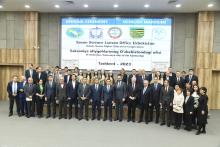Saxon Science Minister Sebastian Gemkow and the Rector of TU Bergakademie Freiberg, Prof Klaus-Dieter Barbknecht, have officially opened an academic liaison office in the Uzbek capital Tashkent.
The task of the "Saxon Science Liaison Office Uzbekistan - Uzbek-Saxon Higher Education Cooperation" is on the one hand to attract young Uzbeks to study at a Saxon university. This is linked to the prospect of them taking up employment with a Saxon company after successfully completing their studies. At the same time, the aim is to intensify cooperation, also with a view to the raw material deposits of the Central Asian country. Uzbekistan needs highly qualified specialists in fields such as mining, geology, mechanical engineering, materials science, environmental technology, economics and business administration, who can receive an excellent academic education at Saxon universities.
The academic liaison office works on behalf of the Saxon Ministry of Science (SMWK) and the Saxon Rectors' Conference under the leadership of the TU Bergakademie Freiberg.
Science Minister Sebastian Gemkow said at the opening of the office:
"It is with great pleasure and optimism that we can today give the starting signal for the work of the office and further intensive cooperation between Saxony and Uzbekistan. Many young Uzbeks are highly motivated to study and find work in Saxony. And we are experiencing great interest and support for our project from the government, business and universities in the country. Our wish and expectation is that future cooperation will create a win-win situation for all sides, particularly in the fields of IT and engineering."
The Chairman of the Saxony Rectors' Conference and Rector of TU Bergakademie Freiberg, Prof. Klaus-Dieter Barbknecht, added:
"With the opening of our liaison office in Tashkent, Saxony's universities are taking another significant step towards international cooperation with the countries in Central Asia. This platform not only serves to recruit students, but also to attract highly qualified specialists to Saxony. Education and science know no borders, and this initiative paves the way for fruitful co-operation between Uzbekistan and our universities in Saxony. The liaison office will create a bridge of knowledge and opportunities between our countries and contribute to the global development of education and innovation."
The Saxon Science Liaison Office Uzbekistan was established in the presence and with the support of the German Ambassador to Uzbekistan, Dr Tilo Klinner, the Minister of Higher Education, Science and Innovation of Uzbekistan, Dr Ibrohim Abdurakhmonov, the Minister of Mining Industry and Geology of the Republic of Uzbekistan, Mr Bobir Islamov, and the Rector of the Saxon Science Liaison Office in Uzbekistan, Mr Bobir Islamov.
In light of the rich deposits of raw materials, the German ambassador emphasised Saxony's great expertise in the field of mining and expressed his thanks on behalf of the German government for the high visibility of this Saxon-Uzbek cooperation.
The tasks of the office are related to the state government's action plan for attracting international specialists to Saxony. With the targeted acquisition of students from certain countries and for specialisations in which there is a shortage of skilled workers, Saxony is to be presented as an attractive working environment from the outset. After starting a degree programme at a Saxon university, contacts with the economy in the Free State are to be established as early as possible, for example through internships or work contracts.
With the opening of the office, preparations are being made to set up a local preparatory college to prepare prospective students for studying at a Saxon university in terms of language, subject and methodology.
Background
Uzbekistan is the most populous country in Central Asia with a well-developed industrial and agricultural base. The share of industry is over 20 per cent and is set to increase further according to government plans. Uzbekistan has experienced stable and steady population growth in recent decades. The demographic structure shows a young population. As part of the Uzbek government's reform policy, universities are to massively advance their internationalisation and open up in teaching and research. However, despite Uzbekistan's existing economic dynamism, the state budget and the national higher education system continue to be characterised by a noticeable shortage of funding. Against this background, the study opportunities in Germany appear attractive. According to the Higher Education Compass of the German Rectors' Conference, there are currently a total of 46 partnerships between German and Uzbek universities (as of June 2022). Prospective students are mainly interested in the fields of economics, engineering and IT sciences.
(Text: Press release by SMWK and LRK Saxony)
